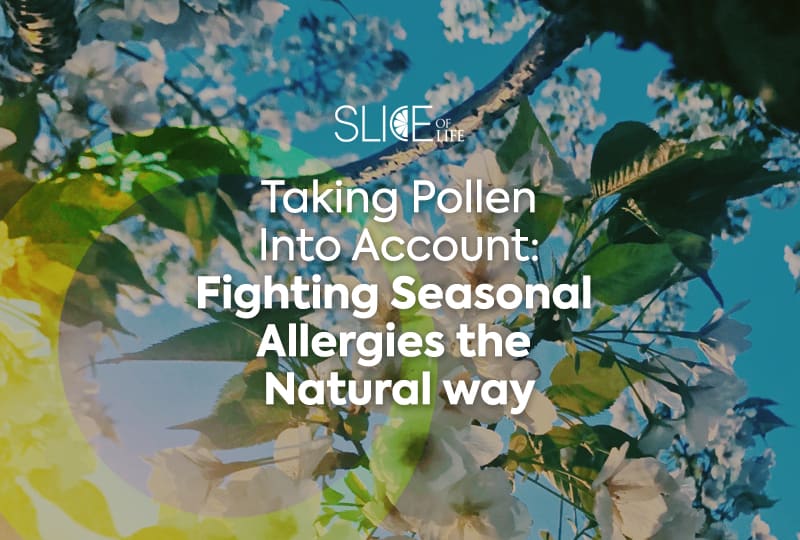The flowers are blooming and pleasing to the eye, but if you are a seasonal allergy sufferer, your nose and throat might find spring to be a less pleasant affair. Seasonal allergies like hay fever and allergic rhinitis can make you uncomfortable and irritable. So, you might wonder how to combat seasonal allergies without immediately running to the pharmacy. The Asthma and Allergy Foundation of America (AAFA) keeps seasonal allergy sufferers informed with their “Pollen Allergy” page.
Pollen Sources
Georgians are plenty familiar with the yellow scourge, a powdery blanket resembling dehydrated butter painting the entire landscape for sometimes weeks on end. It might surprise people to know that Atlanta, Georgia is only considered “average” in terms of its allergic potential, ranking 71 on the 2022 AAFA Allergy report that looks at the 100 Most Challenging Cities in the U.S. to live with seasonal pollen allergies.
Nevertheless, pollen can still be a major pain. Most people blame the budding flowers, but in fact, the three main pollen contributors are tree pollen, grass pollen and weed pollen. Each pollen type affects an individual’s potential for an allergic reaction differently.
Tree pollen is usually the first to emerge each year in the U.S. Grass pollen often overlaps with this timeline as well. Weeds aren’t just aesthetically displeasing on your lawn; they can also trigger allergies. Ragweed is a problem, with about 15% of Americans allergic to it.
Counting Pollen
The term pollen count refers to how much pollen is recorded to be in the air. Devices, such as an air sampler, capture, identify and then count pollen from the air. For updated pollen counts, visit The American Academy of Allergy, Asthma and Immunology’s (AAAAI) National Allergy Bureau site, which reports the most accurate pollen levels.
Some weather reports and other entities will report pollen forecasts as well, but remember that just like standard weather forecasts, things can change quickly, and you may feel allergy symptoms even if the pollen count is reportedly low.
Pollen Allergy Reaction Prevention
Prevention and limiting outdoor exposure is one way to control seasonal allergies.
- Consider limiting outdoor activities or length of time outside when pollen counts are high. This will help cut down the level of pollen allergens you breathe in and help reduce your symptoms. Keep an eye on the pollen counts and forecasts.
- Keep the windows closed during pollen season, especially at peak pollen times.
- Make sure you use a certified asthma and allergy-friendly filter or HEPA filter in all your air conditioning systems and replace them as directed.
- Wearing sunglasses and keeping your head covered outside can keep pollen away from your nose and hair.
- Daily showers or baths are recommended before bedtime to remove pollen from your body and keep it away from your bedding.
- Wash all used bedding in hot, soapy water once a week.
- Be careful with close contact with pets that are frequently outside. Wipe down furry animals as they come in and bathe them weekly if possible.
- Change and wash clothes worn during outdoor activities.
- Don’t dry clothes outside on a line. Use an indoor rack or a dryer.
Home Remedies for Seasonal Allergy Symptoms
Healthline denotes popular home remedies for seasonal allergy symptoms and other common allergies in their article “15 Home Remedies for Allergies.” Please remember that every person is different, so some remedies might work better than others for you. Also, some remedies have yet to have full testing completed to verify their effectiveness, so the important thing is to be safe and consult your primary care professional, such as a chiropractor, as needed.
- Saline Gargles and Saline Nasal Irrigation- Gargling a mix of salt and water can help to cleanse a sore throat. Similarly, saline nasal irrigation, such as a Neti Pot or an approved saline nasal spray, can help clear up the sinuses.
- Honey- The science has not yet caught up with this theory one way or another, but there is a popular idea out there that essentially says that eating locally grown honey can help you lower your potential for allergic reactions over time, as your body becomes accustomed to the pollen in your area because the bees use that pollen to make the honey. Honey is also helpful with soothing sore throats, so drink it in tea or simply eat a spoonful periodically as needed.
- Vitamin C is often used in natural medicine to lower histamine levels.
- Essential oils like peppermint, eucalyptus and frankincense have shown promise in helping to alleviate allergy symptoms. Try putting them in an essential oil diffuser to breathe it in or dilute the oil in a carrier oil for topical use. However, if you have sensitive skin, topical use might not be recommended. Make sure to use as directed and use quality products because essential oils are not yet regulated by the Food and Drug Administration.
Do not use home remedies for severe allergic reactions or anaphylaxis. Any significantly new method of allergy treatment should be discussed with your primary care professional beforehand. Breathe easy and happy spring!
Slice of LIFE is an invitation to and extension of everything happening at Life University. Whether you are a current student, a potential freshman or a proud alum, Slice of LIFE can help keep you connected to your academic community. Know of a compelling Life U story to be shared, such as a riveting project, innovative group or something similar? Let us know by emailing Marketing@life.edu.


Social Media